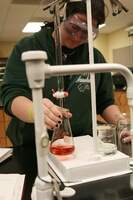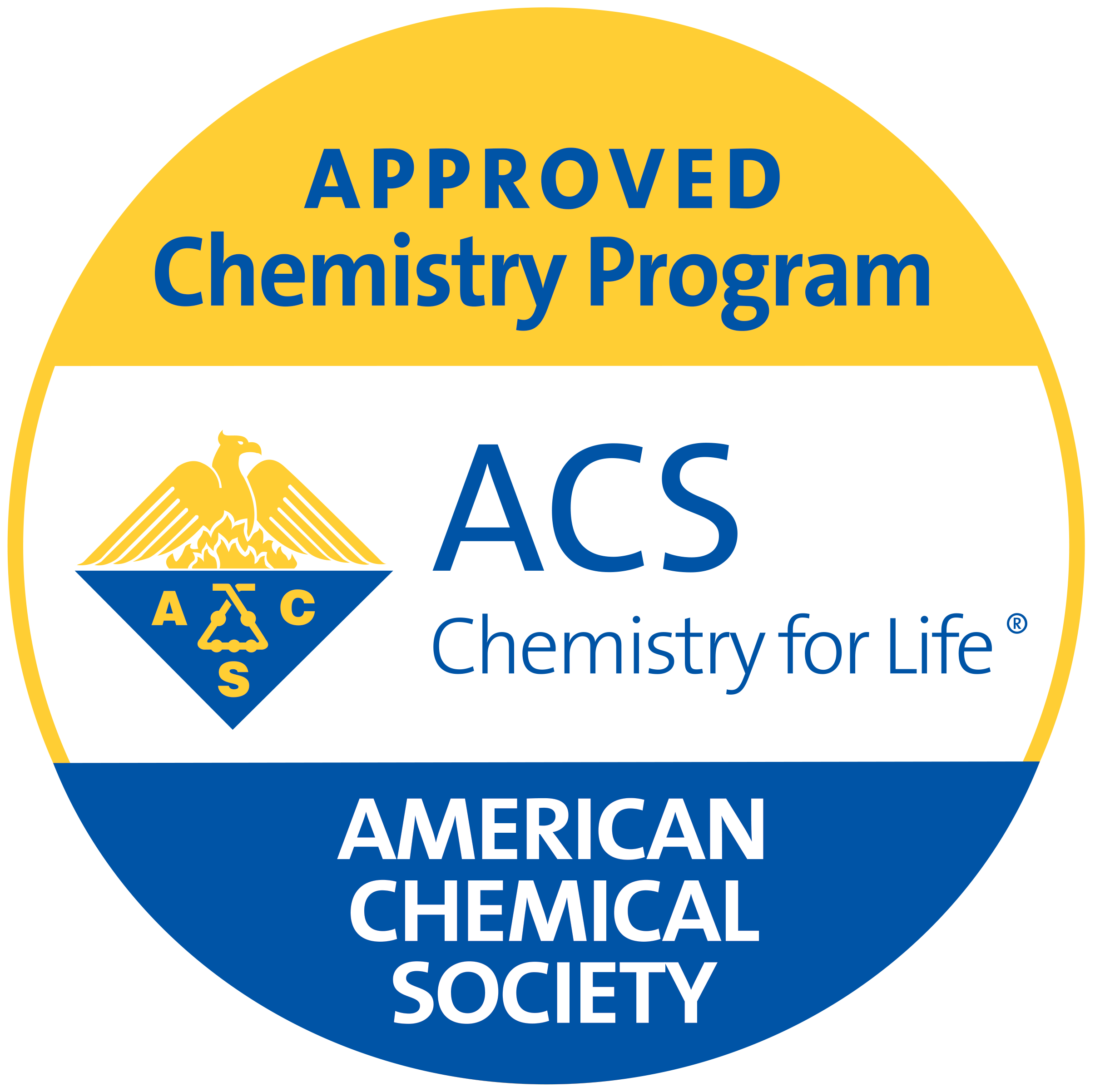Bachelor of Science in Chemistry
Chemistry is all around us - in what we eat, what we breathe, how we live and what we are. Chemists study not only what things are, but also what they do and how they do it. Nearly all sciences and advances in fields such as molecular biology, environmental science, materials science and medicinal chemistry are built upon an understanding of chemistry. You may earn a Bachelor of Science degree in Chemistry or Chemical Education at Northeastern State University. Chemistry courses provide a sound background in chemical principles and challenge students to develop excellent problem-solving skills. Courses in biochemistry, inorganic, physical, analytical, organic, environmental and polymer chemistries comprise the curriculum. Besides formal classroom instruction, chemistry majors sharpen their abilities in a variety of laboratory courses and by the completion of an independent research project.
Obtaining an undergraduate degree in chemistry prepares you for many different careers, including employment as a research chemist or a lab technician in industrial quality control, environmental assessment, forensics, patent law or education. Furthermore, the chemistry program prepares you for pursuing advanced degrees or in entering health-related professional schools (medical, pharmacy, dental, optometry, chiropractic, etc.).
- 7151 - Professional
- 7152 - Environmental
- 7153 - Biochemistry
- 7155 - Chemistry Education
Accelerated B.S. Chemistry to M.S. Natural Science Degree
Note: Please refer to Accelerated Bachelor’s to Master’s Degree Program for complete information concerning the Accelerated Degree Program (ADP). Refer to the current Graduate Catalog for master’s degree requirements.
IMPORTANT:
- Students admitted to the Accelerated B.S. Chemistry: Biochemistry or Chemistry: Professional to M.S. Natural Science degree program will complete up to 6-9 hours of graduate level credit to apply toward both the undergraduate and graduate degrees.
- Students may not receive credit toward both the undergraduate and the paired graduate-level course. A student completing an undergraduate course and the paired graduate-level course will only receive credit for one course toward the bachelor’s degree.
- A minimum grade of C is required for all 5000 level graduate courses.
- Students who do not follow the approved degree plan may become ineligible to continue in the accelerated degree program.
- Prior to completing the undergraduate degree, if the undergraduate GPA, graduate GPA and/or overall GPA fall below a 3.00, the student becomes ineligible to continue in the ADP.
- Students may withdraw from an approved accelerated degree pathway. Graduate credit hours completed prior to the student withdrawing or becoming ineligible to continue in the ADP apply toward the undergraduate degree only.
| CHEM 4412 - Research in Chemistry I | SCI 5530 (2 hrs) - Research in the Natural Sciences |
| CHEM 4723 - Advanced Biochemistry | CHEM 5213 - Advanced Biochemistry |
| CHEM 4911 - Chemistry Seminar | SCI 5511 - Research Seminar |
| Approved Undergraduate-Level CHEM Electives (3 hrs) | Approved Graduate-Level CHEM Electives (3 hrs) |
| CHEM 4412 - Research in Chemistry I | SCI 5530 (2 hrs) - Research in the Natural Sciences |
| CHEM 4911 - Chemistry Seminar | SCI 5511 - Research Seminar |
| Approved Undergraduate-Level CHEM Electives (3 hrs) | Approved Graduate-Level CHEM Electives (3 hrs) |
| Free Electives (3 hrs - Optional) | Approved Graduate-Level CHEM Electives (3 hrs - Optional) |
A Chemistry minor consists of any 18 hours of CHEM courses with the exception of Essentials of Organic Chemistry (CHEM 2004), Chemistry for Life Sciences I (CHEM 3164), and Chemistry for Life Sciences II (CHEM 3264).
Teacher Education Admission and Certification Policies
In addition to courses in the discipline, all students completing a baccalaureate degree that leads to teacher certification must meet the following requirements for certification.
- Be accepted for admission to teacher education, pre-II internship, and full internship according to published course sequence and guidelines.
- Demonstrate proficiency at the high novice level in a language other than English.
- Complete all courses in the major and Professional Education Core with a grade of “C” or higher.
- Students entering NSU beginning Fall 2013 must have an overall GPA of 2.75 for admission to teacher education.
- Once admitted to the teacher education program, all majors must continue to maintain a GPA of 2.5 (overall and in their major field of study) through completion.
- 4 X 12 requirement - Early Childhood, Elementary Education, and Special Education programs require completion of 12 semester hours with a grade of “C” or better in the following disciplines: Communication Arts (English, Communication, Literature), Math, Science, and Social Science (Economics, Geography, History, Political Science, Psychology, Sociology) prior to graduation.
- All Professional Education majors must complete PSYC 1003 or PSYC 1113. Advisors recommend those courses be completed as part of the General Education course sequence.
Degree Available at
- Tahlequah
- Broken Arrow
Transferring to NSU?
Make your transition to NSU as smooth and seamless as possible.
Visit Transfer Student Services for more information.
Career Services
What can I do with a major in Chemistry?

PROGRAM CHAIR

Dr. Nathan Green
green66@nsuok.edu
(918) 449-6477
Program Options
Chemistry, Professional Option
This option is designed to meet the American Chemical Society standards and can result in an ACS certified degree.
For more information about degree requirements, visit the NSU catalog.
Chemistry, Environmental Option
This option includes training in chemistry, biology, and environmental science and is designed for students with an interest in working to improve and maintain the environments.
Chemistry, Biochemistry Option
This option has a special focus on the intersection of chemistry and biology. The molecular level of biomolecules, the molecular basis of human diseases, and biotechnology will be studied. This option can meet the ACS standards and result in an ACS certified degree.

